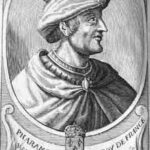Date of Birth
0330
Place of Birth
Westphalia, Prussia, Germany
Towns / Cities Moved Into
-
Known Occupation
-
Religion
-
Death Information
Year of death
27 April 0427
Place of death
Gaul, Roman Empire
Cause of death
-
Obituary

Parents

Favius Richomeres de Toxandrie

Ascyla of Toxandrie
Marital Status


Married Argotta Ripuaires Rosemunde Franks
0395
Germany
Siblings


Children





Narrative / Story
In the year 330, amidst the verdant landscapes of Westphalia in Prussia, Germany, a child named Pharamond was born into a world on the brink of transformation. His parents, Favius Richomeres de Toxandrie and Ascyla of Toxandrie, belonged to a lineage that would shape the course of European history. Pharamond grew up during a time when the Roman Empire’s influence was waning, and various Germanic tribes, including the Franks, were rising in prominence.
Pharamond’s life was one of constant movement and change. As a member of the noble class, his upbringing would have been steeped in the traditions and martial skills befitting a future leader. The socio-economic landscape of his time was dominated by tribal affiliations and warfare, with shifting alliances and territorial disputes being commonplace.
Before 395, Pharamond married Argotta Ripuaires Rosemunde Franks, a union that would further cement his position within the Frankish nobility. Together, they had children, including Fredemundus of the Salic Franks and Clodion Le Chevelu Des Francs Merovingiens, who would carry on his legacy. His life also intertwined with Concubine Ereleuva “Eusebia” of Pannonia, with whom he had Carianic des Francs Morins.
Pharamond’s life was not just defined by his familial ties but also by the broader historical currents of his time. The Roman Empire, under which Gaul (modern-day France) was a province, was undergoing significant changes. The pressure from various Germanic tribes, including the Franks, was intensifying. Pharamond, as a leader among the Franks, would have been deeply involved in these geopolitical dynamics.
His work life, like many of his contemporaries in leadership positions, would have revolved around managing tribal affairs, engaging in diplomacy, and leading in warfare. The Franks were known for their warrior culture, and Pharamond would have been expected to exemplify these qualities.
The period was also marked by migrations, commonly referred to as the “Migration Period.” Tribes moved across Europe, displacing others and forming new settlements. This era was characterized by a mix of conflict, cultural exchange, and the formation of new political entities.
Pharamond’s life, however, was not just about war and politics. It was also about navigating the complex social structures of his time. As a Frankish noble, he would have had to balance the expectations of his tribe with the realities of a changing world. The Franks, like many Germanic tribes, had their own customs and legal systems, which were often in contrast with the Roman ways.
On 27 April 0427, Pharamond passed away in Gaul, part of the Roman Empire. His death marked the end of an era for his family and his tribe. He was buried in Gaul, leaving behind a legacy that would be remembered and revered in the annals of Frankish history.
Pharamond’s life story is a tapestry of personal achievements, familial bonds, and the broader historical forces of his time. His journey from the forests of Westphalia to the halls of power in Gaul encapsulates the tumultuous and transformative nature of the late Roman and early medieval periods in Europe. His legacy, carried on by his descendants, would continue to shape the history of the continent for centuries to come.
